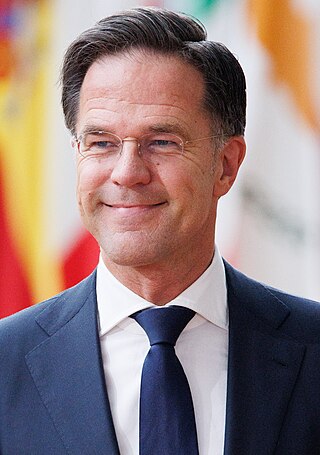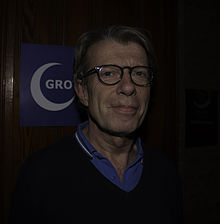
The People's Party for Freedom and Democracy is a conservative-liberal political party in the Netherlands. The VVD, whose forerunner was the Freedom Party, is a party of the centre-right, which promotes private enterprise and economic liberalism.
The Labour Party is a social-democratic political party in the Netherlands.

The politics of the Netherlands take place within the framework of a parliamentary representative democracy. A constitutional monarchy, the country is organised as a decentralised unitary state. The Netherlands can be described as a consociational state. Dutch politics and governance are characterised by a common striving for broad consensus on important issues, within both of the political community and society as a whole.
The Christian Union is a Christian-democratic political party in the Netherlands. The CU is a centrist party, maintaining more progressive stances on economic, immigration and environmental issues while holding more socially conservative positions on issues such as abortion and euthanasia. The party describes itself as "social Christian".

The Christian Democratic Appeal is a Christian-democratic and socially conservative political party in the Netherlands. It was originally formed in 1977 from a confederation of the Catholic People's Party, the Anti-Revolutionary Party and the Christian Historical Union; it has participated in all but three of the Dutch cabinets formed since it became a unitary party.

Democrats 66 is a social liberal and progressive political party in the Netherlands, which positions itself in the centre of the political spectrum. It is a member of the Liberal International (LI) and the Alliance of Liberals and Democrats for Europe (ALDE).

The second Balkenende cabinet was the executive branch of the Government of the Netherlands from 27 May 2003 until 7 July 2006. The cabinet was formed by the Christian-democratic Christian Democratic Appeal (CDA), the conservative-liberal People's Party for Freedom and Democracy (VVD), and the social-liberal Democrats 66 (D66) after the election of 2003. The cabinet was a centre-right coalition and had a slim majority in the House of Representatives with Christian Democratic Leader Jan Peter Balkenende serving as Prime Minister. Liberal Leader Gerrit Zalm, a former Minister of Finance, served as Deputy Prime Minister and returned as Minister of Finance, while former Progressive-Liberal Leader Thom de Graaf served as Deputy Prime Minister and Minister without Portfolio for the Interior.

Wouter Jacob Bos (Dutch pronunciation:[ˈʋʌutərˈbɔs]; is a retired Dutch politician of the Labour Party and businessman.

General elections were held in the Netherlands on 15 May 2002. The elections were amongst the most dramatic in Dutch history, not just in terms of the electoral results, as they were completely overshadowed by the assassination of leader Pim Fortuyn only nine days before election day.

The Catholic People's Party was a Catholic Christian democratic political party in the Netherlands. The party was founded in 1945 as a continuation of the interwar Roman Catholic State Party, which was in turn a successor of the General League of Roman Catholic Caucuses. The party was in government throughout its existence. In 1977, a federation of parties including the Catholic People's Party, the Anti-Revolutionary Party (ARP) and the Christian Historical Union (CHU) ran together under the Christian Democratic Appeal (CDA) banner. The three participating parties formally dissolved to form the CDA in 1980.

The Political Party of Radicals was a Christian-radical, progressive Christian and green political party in the Netherlands. The PPR played a relatively small role in Dutch politics and merged with other left-wing parties to form GreenLeft in 1991.

General elections were held in the Netherlands on 22 November 2006, following the fall of the Second Balkenende cabinet. The election proved relatively successful for the governing Christian Democratic Appeal (CDA) which remained the largest party with 41 seats, a loss of only three seats. The largest increase in seats was for the Socialist Party (SP), which went from nine to 25 seats. The main opposition party, the social democratic Labour Party (PvdA) lost nine of its 42 seats, while the right-liberal People's Party for Freedom and Democracy (VVD) and the progressive liberal Democrats 66 lost a considerable portion of their seats, six of 28 and three of six, respectively. New parties, such as the right-wing Party for Freedom (PVV) of former VVD MP Geert Wilders and the animal rights party Party for the Animals (PvdD) were also successful, with the PVV winning nine seats and the PvdD winning two, thereby becoming the first animal rights group to enter a European parliament.

The Third Lubbers cabinet, also called the Lubbers–Kok cabinet, was the executive branch of the Dutch government from 7 November 1989 to 22 August 1994. The cabinet was formed the christian-democratic Christian Democratic Appeal (CDA) and the social-democratic Labour Party (PvdA) after the election of 1989. The cabinet was a centrist grand coalition and had a substantial majority in the House of Representatives with Christian-Democratic Leader Ruud Lubbers serving as Prime Minister. Labour Leader Wim Kok served as Deputy Prime Minister and Minister of Finance.

The First Lubbers cabinet was the executive branch of the Dutch Government from 4 November 1982 until 14 July 1986. The cabinet was formed by the christian-democratic Christian Democratic Appeal (CDA) and the conservative-liberal People's Party for Freedom and Democracy (VVD) after the election of 1982. The cabinet was a right-wing coalition and had a substantial majority in the House of Representatives with Christian Democratic Leader Ruud Lubbers serving as Prime Minister. Prominent Liberal politician Gijs van Aardenne, a former Minister of Economic Affairs, served as Deputy Prime Minister and returned Minister of Economic Affairs.

Municipal elections were held in the Netherlands on 7 March 2006. About 11.8 million people could vote in 419 municipalities. Due to municipal reorganisations, 15 municipalities held elections in January 2006 and 24 municipalities held elections in November 2006. In some cities, such as Amsterdam, there were two elections, for the municipality and for the borough councils.

Mark Rutte is a Dutch politician who has served as Prime Minister of the Netherlands since 2010. He is currently acting in a demissionary capacity, scheduled to leave national politics following the installation of the next cabinet after the 2023 general election. Rutte was the leader of the People's Party for Freedom and Democracy (VVD) from 2006 through 2023. On 2 August 2022 he became the longest-serving prime minister in the history of the Netherlands.

Following the 2006 Dutch general election, held on November 22, a process of cabinet formation started, involving negotiations about which coalition partners to form a common programme of policy and to divide the posts in cabinet. On February 22, 2007 it resulted in the formation of the Fourth Balkenende cabinet.

The fourth Balkenende cabinet was the executive branch of the Government of the Netherlands from 22 February 2007 until 14 October 2010. The cabinet was formed by the Christian-democratic Christian Democratic Appeal (CDA) and Christian Union (CU) and the social-democratic Labour Party (PvdA) after the election of 2006. The cabinet was a centrist grand coalition and had a slim majority in the House of Representatives with Christian Democratic Leader Jan Peter Balkenende serving as prime minister. Labour Leader Wouter Bos served as Deputy Prime Minister and Minister of Finance while Social Christian Leader André Rouvoet served as Deputy Prime Minister and Minister without Portfolio for Health, Welfare and Sport.

General elections were held in the Netherlands on Wednesday 15 March 2017 to elect all 150 members of the House of Representatives.

Martijn N. Bolkestein is a Dutch politician who served as a member of the House of Representatives between July 2020 and March 2021. He is a member of the People's Party for Freedom and Democracy (VVD).
















